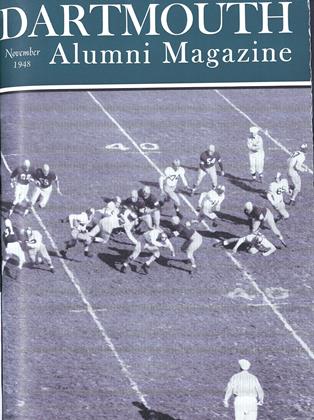David Lambuth
To THE EDITOR:
May I as a granddaughter of a Dartmouth alumnus, and as a Tower Room librarian for nearly twenty years, be permitted to record in your pages a few personal impressions of a great member of your faculty?
Perhaps someone some day will be equal to writing the life of David Lambuth. His was a many sided life. Citizen of four continents, practical architect, experienced rancher, accomplished linguist, connoisseur of the arts, inspired host, incomparable reader aloud—he was all these things, and we who knew it cannot wait to express our sense of what we have lost.
Edwin Arlington Robinson's lines might well have been written, as a description of him:
"With news of nations in his talk And something royal in his walk."
Strangers who saw in the streets of Hanover his fine figure under his French beret and Alpine cloak were apt to ask "who is that distinguished man?" They little knew, however, how inadequate was the mere reply "Professor Lambuth of the English department." They could not know what every student of his came to know—that no young man could come under his influence and remain unchanged.
I who secured each year some of his time for the Tower Room Readings and watched the faces of the listeners, soon learned that it was not only the charm of his reading that moved them but to an even greater degree the sense he conveyed that each author had an immediate personal bearing on themselves, heightening their awareness of life.
True he gave them a few essential facts about each writer, enough to place him in his time and social environment. But to David Lambuth the thing that counted, and that he so richly conveyed, was the author's contact with life in its sensitivity and robustness, the seer in the author in its complete sense, the author's insight into life, past, present, and future, in all its cruelty, delicacy, and beauty, life personal, social, political. He believed with Ruskin that for every ten men who can talk, one can think, and for every ten men who can think, one can see.
It was their quality as seer of life in the present that claimed David Lambuth's devotion to Conrad, and in an eyen deeper sense to Robert Frost whom he delighted to quote.
He was first of all a gallant gentleman and a militant teacher. Those who knew him but slightly might easily be deceived by his unfailing courtesy. Like all able administrators, and he was acknowledged to be such, he did not permit himself to be dragged into petty disputes, but kept his energy for vital issues about which, still with courtesy, he could fight with the best.
Literature was to him an expression of the reality of life, austerity as well as beauty. His was no stupid optimism. The cloak he wore was the cloak of courage to meet what his eyes saw of evil as well as good. Flinch he might at what he discerned completely opposite to his own generosity, cleanness, and compassion, but he never faltered in fighting meanness, ingratitude, and cruelty, in men and nations. Crystalized as these evils so often are in the written word, he daily exploded their sinister power.
It was but a week before his death that we were sitting before the lighted fireplace he had made. He was looking with great physical weariness into the darkness confronting us all, and expressing what he felt about some of the false standards of today. And I ventured to paraphase what he had just said, quoting Shakespeare's saddest sonnet:
"And art made tongue-tied by authority, And folly, doctor-like, controlling skill. And simple truth miscalled simplicity, And captive good attending captain ill."
We who are left can only hope that some time someone will claim that cloak of courage to wear it beneath eyes that see as clearly, and above a heart as unwavering.
Hanover, N. H.
 View Full Issue
View Full Issue
More From This Issue
-
 Article
ArticleCIVIL RIGHTS IN AMERICA
November 1948 By ROBERT K. CARR '29, -
 Article
ArticleA Report from Europe
November 1948 By EDWIN A. BOCK '43 -
 Class Notes
Class Notes1924
November 1948 By JAMES T. WHITE, RICHARD A. HENRY -
 Class Notes
Class Notes1918
November 1948 By ERNEST H. EARLEY, DONALD L. BARR, DAVID L. GARRATT -
 Article
ArticleConvocation Address
November 1948 -
 Class Notes
Class Notes1929
November 1948 By F. WILLIAM ANDRES, EDWIN C. CHINLUND, MORTON C. JAQUITH
Letters to the Editor
-
 Letters to the Editor
Letters to the EditorWHY SEND A BOY TO DARTMOUTH?
May, 1923 -
 Letters to the Editor
Letters to the EditorLETTERS TO THE EDITOR
March 1934 -
 Letters to the Editor
Letters to the EditorLetters to the Editor
December 1938 -
 Letters to the Editor
Letters to the EditorLetters
March 1946 -
 Letters to the Editor
Letters to the EditorLetters
February 1947 -
 Letters to the Editor
Letters to the EditorLetters
Mar/Apr 2010

